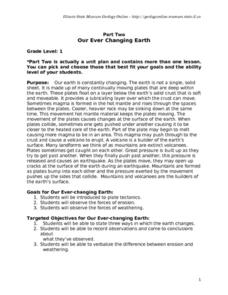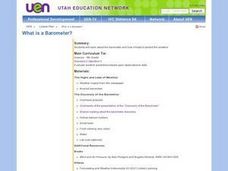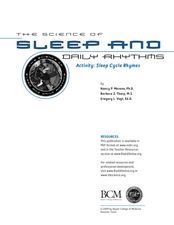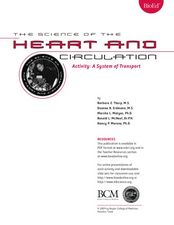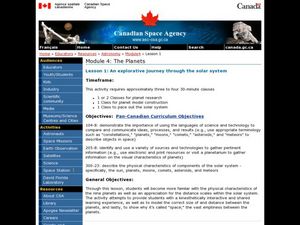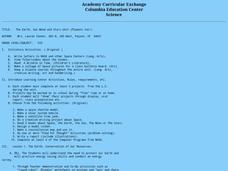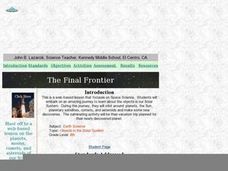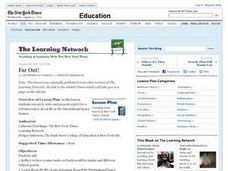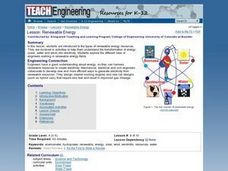Curated OER
New Perspectives
Eighth graders imagine they are getting ready to "take off." They may imagine themselves in any type of aircraft or spaceship. They may then sketch themselves as passengers anticipating this moment.
Curated OER
Our Ever Changing Earth
First graders study ways in which the earth changes due to erosion and weathering in this series of lessons.
Curated OER
How Does the Earth's Energy Budget Relate to Polar Ice?
Students use satellite data to see how radiation budget relates to the ice that is present in the North. In this energy lesson students correlate data to see a relationship.
Curated OER
How Does Flowing Water Shape a Planet's Surface?
Students investigate how flowing water influence landforms. In this earth science lesson, students observe water behavior as it flows from the stream table at various inclinations. They discuss whether water shaped Mars landforms or not.
Curated OER
Science: What Is a Barometer?
Fourth graders discover how barometers help to predict the weather. Using newspapers, they examine the weather forecast and determine the meaning of high and low as they pertain to pressure. After making cluster diagrams, 4th graders...
Curated OER
Why is There a Tidal Bulge Opposite the Moon?
Students simulate how the Moon causes ocean tides. In this earth science lesson, students calculate gravitational acceleration using a mathematical formula. They compare the force of attraction between the Earth, Moon and Sun system.
Curated OER
Introducing Recycling
Students study environmental issues of excess garbage and learn about recycling. In this recycling lesson, students discuss recycling and read a story about too much garbage. Students write a persuasive essay about the importance of...
Curated OER
Newton's Universal Law of Gravitation with Simple Machines
First graders engage in a lesson that is about Newton's Laws Of Gravitation while conducting research in order to perform an information search. They sing a song about the Law of Gravitation and play a game of Ring Around The Rosie. Then...
Curated OER
The Science of Sleep and Daily Rhythms
Students observe their own daily rhythms by going to bed earlier and seeing what happens to their day afterwards. For this sleep lesson plan, students experiment with their own sleep cycles and answer questions about what happened...
Curated OER
Lesson 3: Life Cycle of Brassica Plants
Students investigate the life cycle of brassica plants. In this science lesson, students observe each stage in the life cycle of their plant. Students record their observations and graph the data. Students
Curated OER
Lesson 1: Hot, Not, or Silly
Students discover burn prevention and fire safety while sorting and classifying related pictures. In this early childhood lesson plan, students identify ways to prevent burns, and discuss various ways in which burns may occur. Students...
Curated OER
Day 5 - Science Plants - germination - growth- What plants do we need to survive?
Young scholars look at the crops of the settlers. In this crop lesson, students discuss why each crop was important to the settlers and how they used it. They plant seeds and track and observe the growth.
Curated OER
Star Party- Closing Lesson
Students study the stars and galaxies. In this universe lesson students complete their unit by participating in an evening bonfire to share what they learned.
Curated OER
The Science of the Heart and Circulation
Students mode the transport of blood through the circulatory system with a water relay. In this circulation lesson, students measure amounts of water and transfer them from one container to another. They use this activity to model the...
Curated OER
Strange New Planet
Students simulate different spacecraft missions using materials provided. In this space science instructional activity, students observe and record a planetary model's features from a distance. They relate this activity to scientists'...
Curated OER
Earth System Science
Learners investigate the age of the earth by using accepted scientific methods. They conduct research about the use of radioactive dating and there is a simulation activity of the process. Finally, students measure the radioactive decay...
Curated OER
An Explorative Journey Through the Solar System
Students explore space science by creating a planetary model in class. In this solar system instructional activity, students identify the many planets and moons that make up the solar system and decide on one entity in which to research....
Curated OER
The Earth, Sun, Moon, And Stars
Fifth graders explore the solar system. In this solar system unit, 5th graders investigate numerous projects while rotating through learning centers. Students write about space and construct a space shuttle model. Students practice map...
Curated OER
Planets in Our Solar System
Second graders research climate and landforms on nine planets in our solar system, choose one planet to visit, gather information about their chosen planet's climate and landforms, and "invent" space suit that would enable them to...
Curated OER
Far Out!
Students research and compare/contrast how routine tasks on Earth would be without gravity. They read and discuss the article "The Life Galactic: A Lot of Work, a Little Play, Plenty of E-Mail." In groups they write a pitch for a TV...
Curated OER
Astronomy and Me: Moons Over New Haven
Third graders study the features of different moons orbiting the planets. In this astronomy lesson, 3rd graders explore the different phases of the moon using an interactive online website. They compare and contrast the features of the...
Curated OER
KNOW YOUR PLACE IN SPACE
Students examine the positions of the nine planets in respect to our solar system and explain the unique characteristics of each planet.
Curated OER
TE Lesson: Renewable Energy
Students examine renewable energy sources such as solar, water, and wind. They experiment to determine how renewable energy is transformed into electricity. They investigate the role of engineers who work in the field of renewable energy.
Curated OER
The Comet's Tale
Learners gain an introduction to comets by viewing many examples on websites imbedded in this plan. They discover the origin of comets, what effect they have on Earth and they construct an example of a comet in class.



